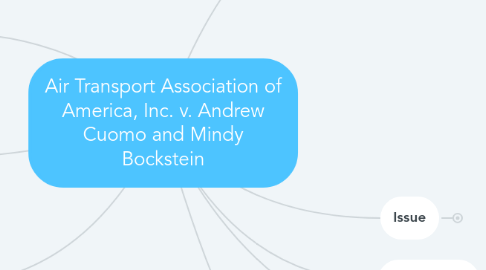
1. Impact
1.1. James Smith (Plaintiff) v. Comair Inc; Delta Airlines, Inc. (Defendant)
1.1.1. Passenger sued airline for breech of contract, false imprisonment, and intentional infliction of emotional distress, arising from airline's refusal to permit him to board his flight after layover due to airline's failure to ask for photo identification at point of original departure.
1.1.1.1. Chief Judge held that 1) Airline Deregulation Act preempted breech of contract claim, 2) ADA preempted passenger's intentional tort allegations to extent they were premised on airline's refusal to permit him to board his flight, 3) to extent intentional tort allegations were not preempted they failed to state claim.
1.1.1.1.1. The Courts found in favor of Comair.
1.2. Frances Hodges (Plaintiff) v. Delta Airlines (Defendant)
1.2.1. Passenger sued for damages against airline based on airline's alleged negligence in allowing storage in overhead compartment of case of rum that fell on her and cut her air and wrist.
1.2.1.1. Courts ruled in favor of the Airline
1.2.1.1.1. In the appeal process the court decision was reversed and remanded since the the claim had no specific reference to airline services and enforcement of claim would not significantly affect airline services.
2. Importance
2.1. This case begins to show some movement on holding airline accountable based on their decisions and not just covering all actions and decisions under ADA.
3. Influence
3.1. We know hear the Customer Service Agent and Flight Attendant offering to check baggage to avoid over crowding items in the overhead bins.
4. Facts
4.1. Parties
4.1.1. Air Transport Association of America, Inc. (Plaintiff)
4.1.2. Andrew Cuomo, in his official capacity as Attorney General of the State of New York, Mindy Bockstein, in her official capacity as Chairperson and Executive Director of the New Your State Consumer Protection Board.
4.2. What Happened?
4.2.1. Airline industry association sued State of New York and state officials, seeking determination that New York Passenger Bill of Rights (PBR), requiring airlines to furnish fresh air, sanitation facilities, water, and food to passengers on flights delayed on ground for more than three hours was preempted by federal law. The United States District Court for the Northern District of New York, granted summary judgement in favor of the defendant.
4.2.1.1. Following a series of well-publicized incidents during the winter of 2006-2007 in which airline passengers endured lengthly delays grounded on New York runways, some without being provided water or food, the New York legislature enacted the PBR.
5. Issue
5.1. New York passenger bill of rights preempted by Airline Deregulation Act (ADA)
6. Rule of Law
6.1. Conflicting or Conforming Laws or Regulations
6.1.1. Implied preemption arises when in the absence of explicit statutory language, Congress intended the federal government to occupy a field exclusively, or when state law actually conflicts with federal law.
6.2. Congressional Intent
6.2.1. Since the existence of preemption turns on Congress's intent, in analyzing whether a state statue is preempted by federal law, a court begins, as it does in any excise of statuary construction, with the text of the federal provision in question, and moves on, as needed be, to the structure and purpose of the federal act in it occurs.
6.3. Preemption in General
6.3.1. A claim under the Supremacy Clause that a federal law preempts a state regulation is distinct from a claim for enforcement of that federal law.
6.4. Duties as to Transportation in General
6.4.1. New York Passenger Bill of Right (PBR), requiring airlines to furnish fresh air, sanitation facilities, water, and food to passengers on flights delayed on ground for more than 3 hours was preempted by ADA; express preemption prevision of ADA stated that a state law was preempted if it related to a price, route, or service of a air carrier, as it substituted its requirements for competitive market forces, by mandating specific services.
7. Analysis
7.1. Air Transport's complaint asserts a claim under the Supremacy Clause and a claim that the PBR violates.
7.1.1. Importantly, does not provide an express private right of action, and we have held with regard to its predecessor statue, which is substantively identical, that no private right of action can be implied.
7.1.1.1. Air Transport cannot sue for a violation of the statue.
7.1.1.1.1. However, Air Transport is entitled to pursue its preemption challenge through its Supremacy Clause claim. The distinction between a statutory claim and a Supremacy Clause claim, although seemingly without a difference in this particular context.
7.2. The Defendant's position is that the PBR is intended to prescribe standards of airline safety.
7.2.1. The intent to centralize air safety authority and the comprehensiveness of these regulations pursuant to that authority have led several other circuits.
7.2.1.1. The FAA preempts the entire field of aviation safety through implied field preemption.
7.2.1.1.1. The FAA and regulations promulgated pursuant to it establish complete and thorough safety standards for air travel, which are not subject to supplementation by law.

